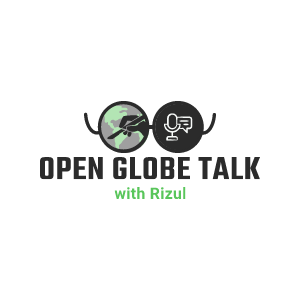February 4, 2022
Episode 18: Dr. Ciku Mathenge, MD PhD
A discussion on
“Eyecare in Africa: Achieving excellence in the Pursuit of Native Eyecare Equity”
Inspirational Women in Global Ophthalmology
Dr. Ciku Mathenge, MD PhD
It is our esteemed pleasure to host Dr. Ciku Mathenge, MD PhD, an eyecare leader in Africa (specifically Rwanda) who has earned adulation and respect among her patients and the global ophthalmology community for her clinical care as well as research. She is currently a medical advisor for the global programs (Africa) at Orbis International. She is also the founder and Director of training and research at the Rwanda International Institute of Ophthalmology.
Dr. Mathenge obtained her Medicine and Ophthalmology training at the University of Nairobi, an Msc in Public Health for Ophthalmology from University College London (UCL), and a PhD at the London School of Hygiene and Tropical Medicine, U. of London. She completed a fellowship in Medical Retina from the Retina Foundation Chennai.
Dr. Mathenge originally spent many years as an ophthalmologist in Nakuru Eye Unit at Rift Valley Provincial Hospital in Kenya where she transformed care. She served as the Regional Medical Advisor for the Fred Hollows Foundation (FHF) and started programs in Kenya, Rwanda, and Burundi. She was awarded the first Sir John Wilson Fellowship by the British Council for Prevention of Blindness and received her PhD from the acclaimed London School of Hygiene and Tropical Medicine where she conducted research in glaucoma, diabetic retinopathy and ARMD in Africa. She has over 30 scientific papers in peer reviewed journals. Currently, Dr. Mathenge has been working diligently on developing the Rwanda International Institute of Ophthalmology (RIIO), a center that aims to become the top center for training and research for all eyecare specialists in the region. Among the many committees Dr. Mathenge has served on, some of them include the ICO advisory committee as well as the ICO Diabetic Retinopathy Task Force.
We have much to learn from this episode as Dr. Mathenge narrates her journey and shares the incredible path that is forged with hard work, integrity, and a pursuit to make her residence a place of progress and ingenuity!
Key discussion points:
Growing up in Nairobi, Kenya
Moving to Nakuru
Interest in Ophthalmology
Journey as a general practitioner to specialization
Being full-time in academia
Kenya vs. Rwanda
Kenya: Only country with 2 UN headquarters, over 40 different tribes and multiple languages, educated majority & high amount of natural resources
Rwanda: Smaller land-locked country with only 1 national language. Cleanest and most secure country in Africa. Invites innovation and conservation efforts. Increasing importance in education and attention to strengthen workforce. Rwandans can also speak English and French.
Eyecare in Rwanda. The positives and negatives
Access to eyecare in African countries is often hampered by 3 things:
Geographic access: distance to services
Cost of services
Lack of personnel/staff
Rwandans tackle first 2 by: universal health coverage (must past referral pathway in right way) and first country to train primary eyecare to all nurses and primary level services.
Unfortunately, not enough ophthalmologists
Cataract is leading cause of blindness
1 in 16 ophthalmologists are trained out of country and have varied skills that may require further training.
Due to physician shortage, specialized surgeries can only occur in tertiary level care!
Accessibility issue. Prefer access to eyecare at district level.
Dr. Mathenge inaugurated residency training program to address shortage.
Biggest support came from ministry of health in Rwanda.
RIIO: physicians recruited also from Kenya and Burundi as well
Many foundations and institutes have supported training
Research in Nakuru
First rapid assessment of avoidable blindness (RAAB) was done in Nakuru
Assessing retinal disease in African eyes
Fred Hollows Foundation
Microsurgery program
Program that changed the face of ophthalmology in Africa forever!
Expanded from Kenya to Rwanda and then Burundi
Orbis International
Focus on education and technology
Cybersight
Rwanda International Institute of Ophthalmology (RIIO)
Partnership with Dr. Agarwal Hospital network and multiple other partners that support by providing visiting faculty.
Took first resident in 2018
Operates as 3 units: school of ophthalmology, community services, research center
Diabetic retinopathy AI research project with Orbis
Support 6 district hospitals with no ophthalmologists: perform cataract surgeries as an outreach project
Currently 14 ophthalmologists in training from 4 different countries
Early life lessons
Overcoming hardships: “I just worked harder than my colleagues because I needed to”
To young female doctors: “Be clear on where you want to go, block out distractions, stereotypes and compete only with yourself!”
Personal research journey
Ocular complications in Rheumatoid Arthritis
MSc in Public Health for Ophthalmology from University College London (UCL) changed perspective
Chose to study prisoners at Nakuru Eye Clinic for Vit A deficiency and its association with general eye health/morbidity (mentor: Dr. Allen Foster MD).
Results changed dietary regimen and demonstrated value of research
Relation with ICH: Through them Nakuru became first center to do RAAB. Helped immensely with data study for blindness.
Now time for younger ophthalmologists in Africa to move from basic research/clinical trials to testing new technologies.
Completed a randomized trial using AI for DR.
Uphill battles: Publication in good journals and their accessibilities
Currently working on having country’s own journals to initiate more research output and encourage scholarly discussion
Africa is moving rapidly in the right direction of eyecare
Vision for Africa, 2-fold:
Demand side of eyecare
Early eye treatment and prevention of blindness. Need massive campaigns for raising awareness.
Supply side of eyecare
Well trained eyecare force from nurses to optometrists, orthoptists, all specialties in ophthalmology in all country of Africa
Need good local programs for training!
“Proudest moment will be when my first resident will graduate!”
Episode-based Resources:


